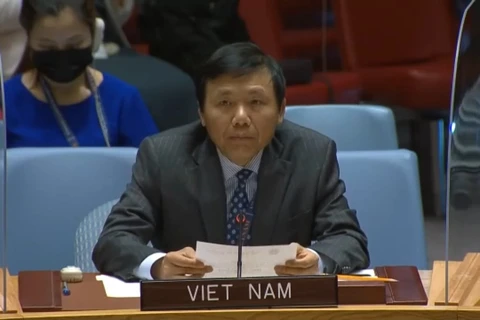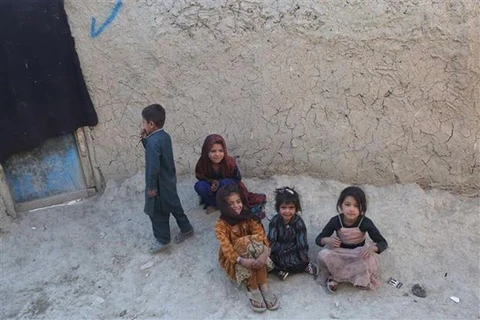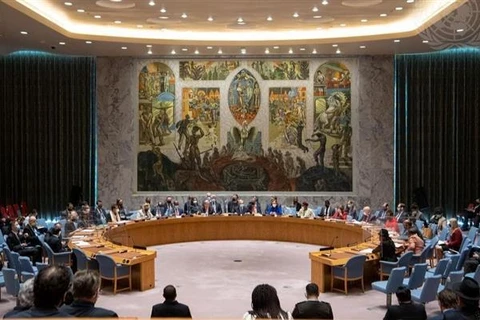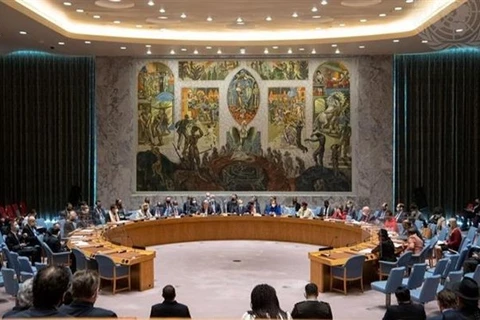New York (VNA) – Ambassador Pham Hai Anh, Chargé d’Affaires a.i. of Vietnam to the United Nations, stressed the importance of the protection of education in conflicts while attending the UN Security Council’s arria-formula meeting on this issue on December 6.
Anh said that through education, it is possible to teach children about tolerance, culture of peace and respect for law, and help protect them from extremism and terrorism. Regarding the responsibilities of countries, the Vietnamese representative affirmed that nations must bear the main responsibility in protecting and ensuring the safety and security of children.
Parties involved in armed conflicts must end attacks on schools, as well as violations of children's rights, and prevent the recruitment of children into armed groups, he said, proposing countries invest and support each other in tackling poverty and inequality, which are seen as sources of conflicts.
Regarding programmes for children during and after conflicts, Anh said that the issue of children must be put at the centre of efforts to build peace and prevent conflicts with a long-term funding mechanism. Programmes should focus on providing psychological and social support and creating a favourable reintegration environment for children. With this in place, children in armed conflicts can become agents of changes for peace, he added.
For international cooperation, the Vietnamese diplomat called on the international community to provide necessary financial resources for children in conflicts to promote their development. He showed support for the UN's coordinating role, as well as the contributions of regional organisations to poverty reduction, promotion of universal education and sustainable development at national, regional and international levels.
He also reaffirmed that Vietnam always prioritises and puts the children-related issue in national development programmes and is committed to working with all partners to ensure the best rights and interests of children.
At the meeting, UNSC member states and rapporteurs called for an end to attacks on schools, teachers and students, as well as the use of schools and educational facilities for military purposes./.
Anh said that through education, it is possible to teach children about tolerance, culture of peace and respect for law, and help protect them from extremism and terrorism. Regarding the responsibilities of countries, the Vietnamese representative affirmed that nations must bear the main responsibility in protecting and ensuring the safety and security of children.
Parties involved in armed conflicts must end attacks on schools, as well as violations of children's rights, and prevent the recruitment of children into armed groups, he said, proposing countries invest and support each other in tackling poverty and inequality, which are seen as sources of conflicts.
Regarding programmes for children during and after conflicts, Anh said that the issue of children must be put at the centre of efforts to build peace and prevent conflicts with a long-term funding mechanism. Programmes should focus on providing psychological and social support and creating a favourable reintegration environment for children. With this in place, children in armed conflicts can become agents of changes for peace, he added.
For international cooperation, the Vietnamese diplomat called on the international community to provide necessary financial resources for children in conflicts to promote their development. He showed support for the UN's coordinating role, as well as the contributions of regional organisations to poverty reduction, promotion of universal education and sustainable development at national, regional and international levels.
He also reaffirmed that Vietnam always prioritises and puts the children-related issue in national development programmes and is committed to working with all partners to ensure the best rights and interests of children.
At the meeting, UNSC member states and rapporteurs called for an end to attacks on schools, teachers and students, as well as the use of schools and educational facilities for military purposes./.
VNA
























